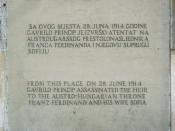There were many events leading up to world war, each doing its own significant part in causing the outbreak. Although they all had input in causing the war, it is obvious that certain events were historically more important than others. In the following, I shall identify those which I think are the most important and compare all of them to conclude which had the most influence leading to the war.
Alliances and agreements between countries can largely be blamed for the war, as they were incredibly significant. In 1882, during the rule of Otto von Bismarck, Germany signed a triple alliance with Italy and Austria-Hungary so as to help give Germany a secure dominant position in European affairs. It was not until 1894, 4 years after Bismarck's fall from power, that another major alliance was formed - the Dual Alliance between France and Russia. The formation of alliances continued as in 1904 the British and the French signed the Entente Cordiale, although the agreement mentioned nothing about helping eachother out militaristically.
The triangle between France, Russia and Great Britain was completed in 1907, when Britain signed the Anglo-Russian Convention. Serbia was also very close with Russia, as they shared many aspects of culture such as language and religion. With all these alliances it was inevitable that, should just one of the countries go to war, many more countries would get involved.
The Agadir crisis of 1911 can also be held highly responsible for putting into play the motions which would result in world war. In May 1911, the French sent troops into Morocco so as to put a halt to the uprisings and risk of national revolt. The Germans understood the arrival of French troops as a sign that the French would soon annex the territory, and Kaiser Wilhelm...


